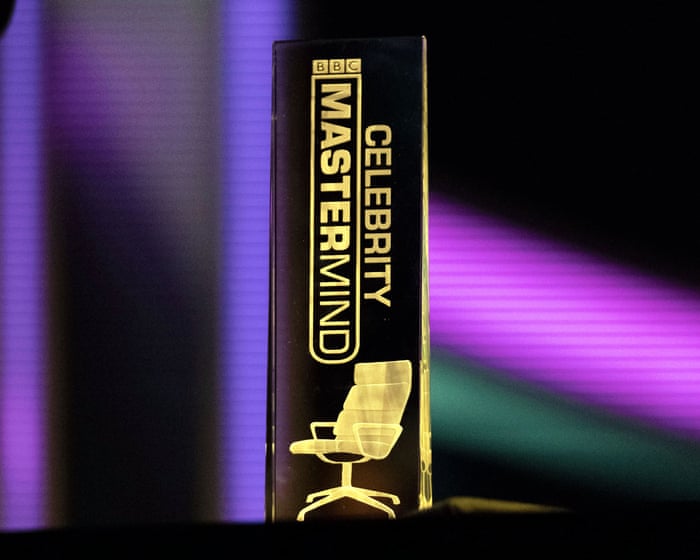Monty Panesar a afirmat cândva că Germania își dispută meciurile de fotbal de acasă la Atena. David Lammy a identificat greșit moștenitorul lui Henric al VIII-lea ca fiind Henric al VII-lea. Iar actrița Amanda Henderson a răspuns „Sharon” când a fost întrebată despre Greta Thunberg.
Evidenta slabă a lui Panesar la Celebrity Mastermind acum șase ani a fost recent folosită pentru a-l ridiculiza de către căpitanul echipei australiene de cricket, Steve Smith. Răspunsurile greșite ale lui Lammy din emisiunea BBC din 2009 au fost aduse în discuție de Robert Jenrick pentru a pune la îndoială inteligența ministrului justiției, pe care acum îl numește „Mastermind”. Greșeala lui Henderson din 2020 despre Thunberg a stârnit atâta agitație pe rețelele sociale încât activistul suedez pentru climă și-a schimbat pentru scurt timp numele pe Twitter în Sharon.
Riscurile de a apărea la un concurs de cultură generală cunoscut pentru a atrage intelectuali par evidente și îți pot afecta reputația pe termen lung. Deci, de ce acceptă celebritățile să participe?
Agenții lor susțin că le poate crește notorietatea și poate evidenția latura lor cu care publicul se poate identifica. Bronagh Monahan, cofondatoarea Mon Rae Management, care reprezintă creatori de conținut de pe YouTube, a spus: „Aceste spectacole sunt de obicei pentru caritate, deci există o asociere pozitivă. Participarea este ceea ce contează. A face greșeli arată că ești om, ceea ce te poate face mai simpatic.”
Dar John Crace, redactorul de schițe al ziarului Guardian, nu este de acord, încă bântuit de scrierea greșită a cuvântului „mozzarella” la Celebrity University Challenge. „Familia mea încă mă tachinează cu 'Mozzarellagate'”, a recunoscut el. Crace sfătuiește să nu apari la astfel de emisiuni: „Dacă nu ești excepțional de deștept, e probabil să te faci de râs. Producătorii speră să dai greș pentru că asta face televiziunea distractivă.”
Crace a avertizat că University Challenge este și mai umilitor decât Mastermind, deoarece necesită să răspunzi rapid, cu răspunsuri potențial incorecte și nu îți permite să te pregătești pe o temă specializată. „E mult mai greu la televizor decât să joci acasă. Am crezut că voi fi un star, dar nu am fost”, a reflectat el.
Nu toate experiențele la concursuri de cultură generală se termină cu rușine. Jurnalistul și scriitorul David Hepworth a ezitat inițial să se alăture echipei la University Challenge, temându-se că va fi demascat, dar soția lui l-a convins observând: „Nu vei mai avea o altă șansă.” Nu a regretat după ce a ajutat echipa sa Middlesex să câștige în 2023. Cu toate acestea, tot nu ar lua în considerare participarea la Celebrity Mastermind, numindu-l „o exercițiu de exploatare televizuală.”
Profesorul de matematică Bobby Seagull și-a construit o carieră în media pe baza succesului său la University Challenge, câștigând și edițiile pentru celebrități ale Mastermind și Pointless. Acesta instruiește acum concurenți celebri. „Sfatul meu este să vă relaxați și să vă bucurați. Dacă o luați prea în serios, atunci... intrați în panică și cădeți în ciclul acela de eșec pe care l-am văzut atât de des la concursurile pentru celebrități.” Sfaturile lui Seagull includ ascultarea înregistrărilor prezentatorului pentru a vă familiariza cu pronunția și vizionarea în exces a altor emisiuni de concursuri.
Chiar și Seagull este tulburat de întrebări la care a răspuns greșit, cum ar fi confundarea lui Barry Manilow cu Rod Stewart. El a susținut că eșecul lui Panesar la Mastermind ar fi putut să se întâmple oricui.
Seagull a spus: „Dacă faci câteva greșeli, îți zguduie cu adevărat încrederea. Ca profesor de matematică, văd asta în clasă tot timpul. Nu contează cât de deștept ești — ai putea fi Stephen Fry, și o ceață mentală îți poate bloca capacitatea de a recupera informații sub presiune.”
El a avertizat celebritățile să evite rețelele de socializare dacă fac o gafă. Atacurile online au devenit atât de severe încât Seagull se îndoiește de viitorul unor astfel de spectacole. „Riscul de a fi atacat pe rețelele de socializare a ajuns într-un punct în care devine greu pentru producători să atragă celebrități notabile la aceste programe”, a spus el.
Alex Segal, directorul general al agenției de talente InterTalent, nu este de acord. „Oamenii participă la aceste spectacole pentru expunere, pot câștiga bani frumoși pentru caritate și este distractiv. Nu este atât de grav.”
Segal își avertizează clienții că ar putea fi făcuți să „pară proști”, iar uneori i-a sfătuit să nu apară la Mastermind atunci când celebritățile nu au timp să studieze subiectul lor de specialitate. Dar el a spus că chiar și răspunsurile greșite pot fi divertente. „L-am avut pe Omid Djalili la Mastermind. Când nu știa răspunsurile, a venit cu cele mai ridicole. Nu părea rău; părea doar amuzant.”
Când a fost întrebat despre numele alternativ al șarpelui cu clopoței cornut în funcție de mișcarea sa, Djalili a răspuns „se târâște erotic”. Răspunsul corect era sidewinder.
Întrebări frecvente
Desigur, iată o listă de întrebări frecvente despre riscurile de a concura la un concurs TV pentru celebrități, structurată în jurul temei „Încă simt rușinea”.
Întrebări generale pentru începători
1. Ce înseamnă „Încă simt rușinea” în acest context?
Este o modalitate de a spune că momentele rușinoase sau umilitoare de la emisiune pot rămâne cu tine mult timp după ce s-a terminat, afectându-ți încrederea.
2. Despre ce fel de concursuri TV este vorba?
Emisiuni precum Family Feud, The Masked Singer, Celebrity Jeopardy sau orice program în care celebritățile concurează, adesea în probe amuzante sau sub presiune ridicată.
3. Care este cel mai mare risc al participării la un astfel de concurs?
Cel mai mare risc este umilirea publică. O prestație slabă, un costum ciudat sau un răspuns greșit pot deveni un meme viral care te va defini ani de zile.
4. Există beneficii reale în a participa la aceste emisiuni?
Da. Pot fi o modalitate excelentă de a-ți spori notorietatea publică, de a te conecta cu fanii într-un mod nou și, adesea, joci pentru o cauză caritabilă care îți este dragă.
Probleme comune și riscuri profunde
5. Îmi este teamă că voi arăta prost la televizor național. Este o preocupare reală?
Absolut. Aceste emisiuni sunt montate pentru a oferi un maxim de divertisment, ceea ce înseamnă adesea evidențierea celor mai amuzante greșeli sau a momentelor cele mai stânjenitoare, nu a celor mai deștepte ale tale.
6. Ce se întâmplă dacă răspund greșit la o întrebare cu adevărat stânjenitoare?
Din păcate, acel clip va trăi probabil pentru totdeauna pe internet. Poate fi folosit în meme, compilații de eșecuri și menționat de prezentatorii de talk-show pentru mult timp.
7. Ar putea afecta de fapt cariera mea?
Da, în funcție de imaginea ta. Dacă ești cunoscut ca un actor sau intelectual serios, o prestație neinspirată sau slabă ar putea face mai dificil pentru public și pentru regizori să te ia în serios în roluri viitoare.
8. Care sunt riscurile sociale?
S-ar putea să fii mereu tachinat de prieteni, familie și public. Trollii online și comentariile negative pe rețelele de socializare pot fi intense și greu de ignorat.
9. Presiunea este cu adevărat atât de diferită de cea a unui job obișnuit de actorie?
Da. Într-un rol scriptat, ai control. La un concurs TV, reacționezi în timp real și nu există un regizor care să strige „cut!” dacă dai greș. Presiunea de a fi



